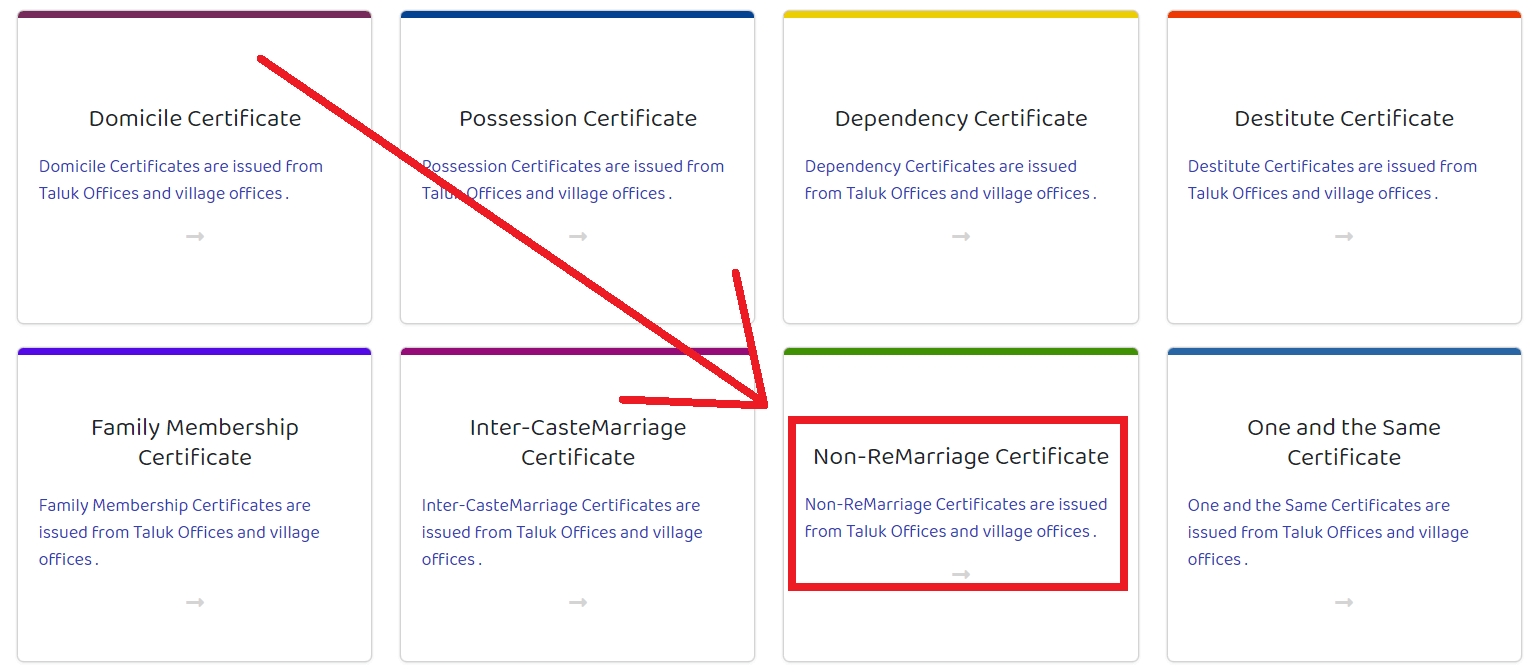How to get Non Remarriage Certificate in Kerala?
- Sections
- Documents Required to get Non Remarriage Certificate in Kerala
- Edistrict Registration
- Apply Online for Non Remarriage Certificate in Kerala
- Track Status of Non Remarriage Certificate in Kerala
- Download Non Remarriage Certificate in Kerala
- Apply Offline for Non Remarriage Certificate in Kerala
- Issuing Authority
- Charges for Non Remarriage Certificate in Kerala
- Time Required for Non Remarriage Certificate in Kerala
- Kerala Non Remarriage Certificate Validity
- FAQs
The Government of Kerala issue the non-remarriage certificate for women when Spouse is deserted/ divorced/ dead.
If Non-Remarriage Certificate is required for Outside State Purposes, the certificate will be issued from Taluk(s) Office.
If Non-Remarriage Certificate is required for State Purposes, the certificate will be issued from Village(s) Office.
Documents Required to get Non Remarriage Certificate in Kerala
Following documents are required to get Non Remarriage Certificate in Kerala.
-
Aadhaar Card
-
Affidavit
-
Death Certificate
-
Election ID Card
-
Ration CardSchool Certificate
You can attach pdf documents only. A file size of maximum 100kb per page will be allowed. While scanning use gray scale with maximum 100 dpi. Multiple pages of the same document may be scanned into a single pdf with maximum of 10 pages.
Edistrict Registration
To get Non Remarriage Certificate online, you need to register in the Kerala E-district portal.
Follow the below steps to register in Edistrict portal.
-
Visit Kerala E-District portal.
-
Click on "Create Account".

-
Enter the basic details about the applicant such as name, address, aadhaar number etc.
-
Provide the login and password details.
- Applicant has to validate their Aadhaar number to complete the registration in E-district portal.
Apply Online for Non Remarriage Certificate in Kerala
Follow the below steps to apply online for Non Remarriage Certificate in Kerala.
-
Login to Kerala E-District portal.
-
Click on "Non Remarriage Certificate".

- Click on "Apply Now".
-
Select the eDistrict Register No.
-
Select the purpose of the application. (State Purpose/Outside State Purpose)
- Enter the details of applicant and the spouse.
-
Provide the declaration.
-
Click on "Save and Forward".
-
Upload the required documents.
-
Click on Next.
-
Make the required payment.
Track Status of Non Remarriage Certificate in Kerala
Follow the below steps to track the status of your Non Remarriage Certificate in Kerala.
-
Login to Kerala E-District portal.
- Click on "Certificate Applications".

- Choose "From Date" and "To Date". Click on "Go".
-
Now you can see the list of all your requests.
-
Click on the certificate request to view the status of the request.
Download Non Remarriage Certificate in Kerala
If your application is approved, you will get an SMS informing that your Non Remarriage certificate is issued. Follow the below steps to download the Non Remarriage Certificate in Kerala.
-
Login to Kerala E-District portal.
- Click on "Certificate Applications".
-
Choose "From Date" and "To Date". Click on "Go".
-
Click on Non Remarriage Certificate to download it.
Apply Offline for Non Remarriage Certificate in Kerala
-
Visit the Village Office or the nearest Akshaya Centre in your area.
-
Fill the Non Remarriage Certificate Application Form.
-
Submit the Application along with the supporting documents.
Issuing Authority
-
Non Remarriage Certificates are issued from Taluk Offices & Village offices.
Charges for Non Remarriage Certificate in Kerala
If you are obtaining the service from Akshaya Centre, your charges will be
-
General Category- Rs 25 through Akshaya and Rs. 15 through E-district Portal
-
BPL card- Rs 15 through Akshaya and Rs. 15 through E-district Portal
Time Required for Non Remarriage Certificate in Kerala
-
Non Remarriage certificate in Kerala will be issued 5 days from the date of application.
Kerala Non Remarriage Certificate Validity
-
Non Remarriage certificate in Kerala will be valid for a specified minimum period.
FAQs
You can find a list of common Non Remarriage Certificate Kerala queries and their answer in the link below.
Non Remarriage Certificate Kerala queries and its answers
Tesz is a free-to-use platform for citizens to ask government-related queries. Questions are sent to a community of experts, departments and citizens to answer. You can ask the queries here.
Ask Question
 Share
Share





